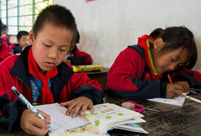 'Model husband' shatters image of love
'Model husband' shatters image of love
 Can animals smile? Or put on a happy face
Can animals smile? Or put on a happy face
 Geng Xuan crowned at 9th China Super Model Contest
Geng Xuan crowned at 9th China Super Model Contest
 Top 10 billionaires in the liquor industry
Top 10 billionaires in the liquor industry
 Backstage at China Fashion Week
Backstage at China Fashion Week
 Ballerinas anywhere but onstage
Ballerinas anywhere but onstage
 Top 10 safest airlines in the world
Top 10 safest airlines in the world
 Posters of 33rd HK Film Awards unveiled
Posters of 33rd HK Film Awards unveiled
 Top 10 most popular instant messaging apps in the world
Top 10 most popular instant messaging apps in the world
 Inspiring shadow images of Chinese army
Inspiring shadow images of Chinese army
BOAO, Hainan, April 10 -- When Zhang Yue decided to ground his two private jets for good to reduce carbon emission a couple of years ago, his family and friends thought he must be out of his mind.
Zhang, chairman of air conditioner producer Broad Group, said it is a pity that those worrying over climate change are still seen as offbeat, when attending a panel on climate change at the ongoing Boao Forum for Asia which will end on Friday.
"Climate change seems to be an alternative ideology," Zhang said, "some people think there's nothing to say about climate change, let alone to do anything about it."
Zhang is not alone. The panel discussion underlined the dilemma that crippled the global campaign on climate change: all talk, no action.
Rui Chenggang, moderator of the panel and popular news anchor, was "troubled" by the fact that Chinese tycoons are buying aircraft, heedless of greenhouse gases. Private jet ownership in China is expected to reach 800 by 2020, according to Wealth-X, a wealth research and consultancy firm.
The public indifference to climate change is not confined to China. Only 24 percent of Americans say they worry a great deal about the issue, which puts climate change near the bottom of a list of 15 social concerns in a recent survey by Gallup.
Although mainstream academia believe in climate change, half of the public still do not buy it, Qin Dahe, a member of Intergovernmental Panel on Climate Change, said at the panel.
Zhang said a lot of things can be done to cut carbon emissions. For example, more thermal insulation in buildings will make people less inclined to use air conditioners. Better urban planning will help reduce traffic flow and congestion. Both will cut energy consumption.
"We know so much but we do so little, economic development always tops the agenda," he added.
Addressing climate change is not necessarily at the sacrifice of economic growth. If China's energy productivity reaches the level of the United States, the size of the economy will have tripled, with carbon emission being significantly lowered in the meantime, according to Qin.
To really mitigate and adapt to climate change requires the synergy of all parties, from scientists, to government and the public, said the climate scientist.
"Findings of research on climate change should be included in the textbooks of middle schools. Students should be exposed to related theories in geology class," he added.
 Wonderful moment of China's airborne forces
Wonderful moment of China's airborne forces Bai Baihe shoots for fashion magazine
Bai Baihe shoots for fashion magazine Red terraced fields in Dongchuan of Yunnan
Red terraced fields in Dongchuan of Yunnan Jiaju Tibetan Village
Jiaju Tibetan Village Spring dating
Spring dating Confucius institute at UC Davis
Confucius institute at UC Davis Little painted faces at temple fair
Little painted faces at temple fair Top 10 safest airlines in the world
Top 10 safest airlines in the world Foreign students at China-Myanmar border
Foreign students at China-Myanmar border The backstage of the Fashion Week
The backstage of the Fashion Week College students in Han costumes
College students in Han costumes Postgraduate works as waitress
Postgraduate works as waitress Life in a Lahu village in Yunnan
Life in a Lahu village in Yunnan An orphan’s wedding
An orphan’s wedding Hollywood documentary brings Diaoyu Islands truth to new audience
Hollywood documentary brings Diaoyu Islands truth to new audienceDay|Week|Month